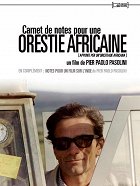Regie:
Pier Paolo PasoliniDrehbuch:
Pier Paolo PasoliniMusik:
Gato BarbieriInhalte(1)
Ein Freiform-Essay-Film des grossen Pasolini als selbstkritische Geste gegenüber einem Film, der auf Oresteia basiert und in Afrika spielt, aber nie gedreht wurde. Vielleicht zeigt Pasolini hier mehr als anderswo seine politische Einstellung wie auch den radikal avantgardistischen Charakter seiner Filmpraxis. (Locarno Festival)
Kritiken (1)
Pasolini is a communist without progressive faith in economic modernization, nostalgically looking backward rather than forward, seeking authenticity in human life unspoiled by the empty greed of capitalist civilization. Pasolini finds a non-utilitarian way of experiencing the world either in the past (his work inspired by antiquity, later the Trilogy of Life set in the Middle Ages), or in the (lumpen) proletariat of southern Italy (a recurring theme in his work, strictly speaking, however, also - through the irreversible disappearance of this way of life in post-industrial Italy - belonging to the order of history), or as here - in the combination of both. Africa as the intersection of history and the present: the present symbolizing modernization in the form of pervasive consumerism, sparing no developing countries, which are presented as the only possible future; history as the experience of a time when soulless rationality and the utility of market society had no place alongside liberating irrationality, the uselessness of actions imbued with freedom, and naïve yet eternal connections between people and beliefs, traditions, customs, and religions. Africa as a challenge to the third world, fighting against imperialism and thus against the consumerism of the first world, in order to create a better future through the synthesis of the past and the present.
()
Galerie (1)
Photo © Locarno Film Festival

